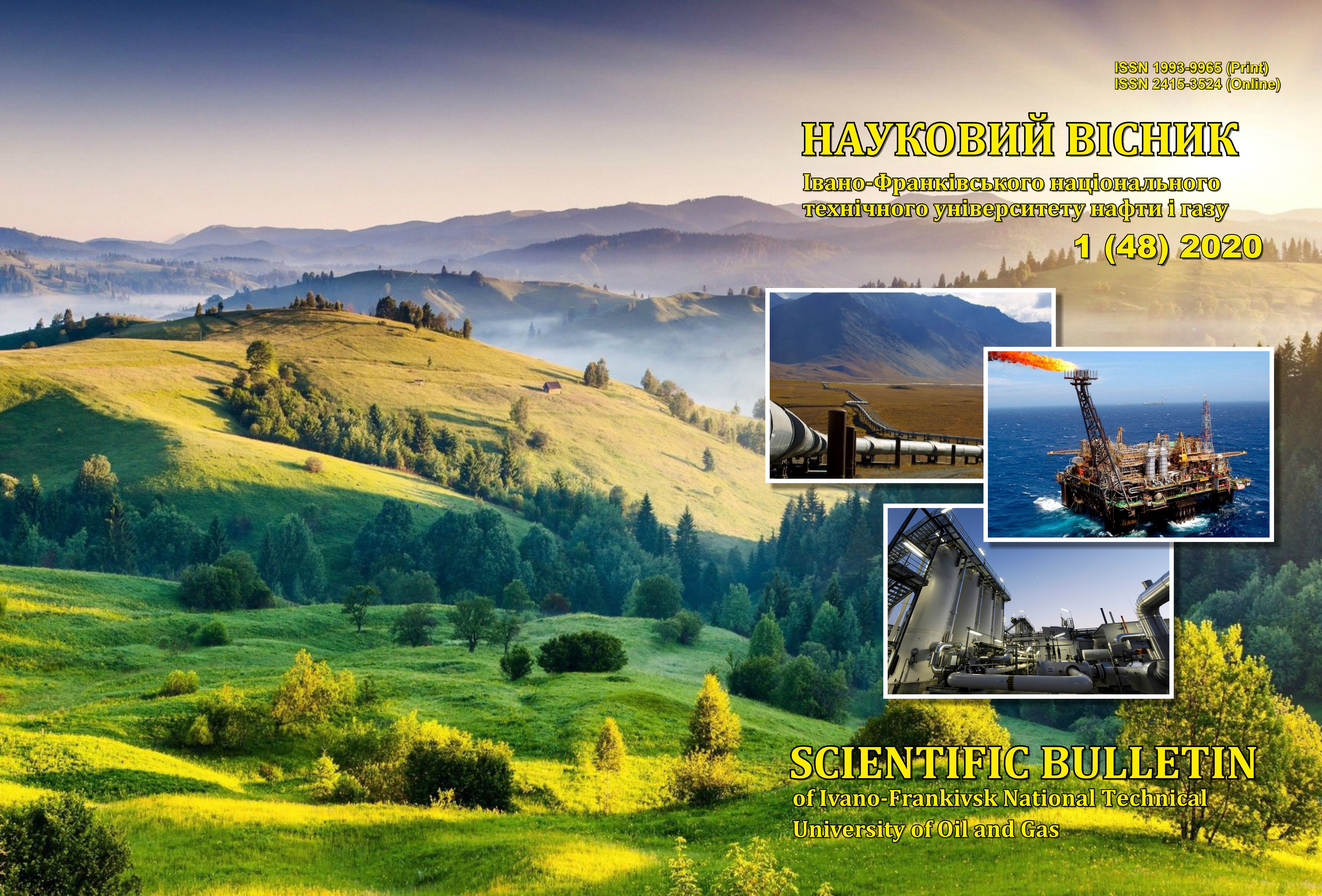Development of the mathematical model for calculation of energy efficiency of mobile diesel compressor stations
DOI:
https://doi.org/10.31471/1993-9965-2020-1(48)-56-65Keywords:
mathematical model, engine characteristics, workflow, mobile compressor station, diesel power drive, energy efficiency improvement, compressed gas cooling system, refrigerantAbstract
The experience of development of domestic and foreign specialists in the sphere of energy loss reduction
during gas cooling of mobile diesel compressor stations of the oil and gas industry is analyzed. The reason why the productivity of the compressors decreases after short period of operation, while the specific energy consump-tion increases. The disadvantages of existing cooling systems of compressed gas of mobile diesel compressor sta-tions are presented. Requirements for refrigerant coolants for compressor gas cooling systems are formulated. A reasonable choice of Freon R134a as a coolant for cooling of the compressed gas of the compressor stations is made. The structure and principle of operation of the system of high-efficiency reduction of temperature of the perspective system of cooling of compressed gas are presented. The tasks and basic assumptions of mathematical modeling of energy efficient scheme of gas cooling system are formulated. The purpose of this article is to investigate theoreti-cally the choice of coolant for a promising highly efficient system for cooling the compressed gas of mobile diesel compressor stations in the oil and gas industry. Inputs, outputs and general structure of mathematical model of multistage gas cooling of mobile diesel compressor stations are offered. The structure of the system of high-efficiency reduction of temperature of the perspective system of cooling of compressed gas and the principle of action are presented. The description and calculation formulas of the mathematical model of compressed gas cool-ing of mobile diesel compressor stations are given. When choosing a refrigerant with the condition of further use of the obtained energy, the main requirement was taken into account. The total specific energy costs for the opera-tion of the compressor installation according to the existing and perspective schemes and its energy efficiency indicators are determined.
Downloads
References
Denisov-Vinskiy N.D. Nekotorye rezul'taty energeticheskogo obsledovaniya sistem vozduho-snabzheniya predpriyatiy. Kompressornaya tehnika i pnevmatika. 2013. No 1. P. 26-29. [in Russian]
Safaei H., Keith D., Hugo R.J. Compressed air energy storage (CAES) with compressors distributed at heat loads to enable waste heat utilization. Applied Energy. Mart 2013. Vol. 103. P. 165-179.
Rybin A.A. Energeticheskaya optimizaciya sistem ohlazhdeniya vozdushnyh kompressornyh ustanovok. Promyshlennaya energetika. 2005.
No 6. P. 42-43. [in Russian]
Ansari N.A., Salu S.A. Maximum Recovery of Gas Compression Waste Energy. International Petroleum Technology Conference. Doha, Qatar. 19-22 January 2014.
Astanovskiy D.L., Astanovskiy L.Z., Verteleckiy P.V., Sil'man M.A. Teploobmennye apparaty dlya kompressornyh ustanovok. Kompressornaya tehnika i pnevmatika. 2010.
No 5. P. 6-9. [in Russian]
Raschetnoe issledovanie vliyaniya vpryska vody na harakteristiki kompressora gazoturbinnoy ustanovki GT-009 / Yu.M. Anurov, A.Yu. Peganov, A.V. Skvorcov, A.L. Berkovich, V.G. Polischuk. Teploenergetika. 2006. No. 12. P. 19-24. [in Russian]
Sereda, S.O., . Gel'medov Sh., Muntyanov I.G. Eksperimental'noe issledovanie vliyaniya vpryska vody vo vhodnoy kanal mnogostupenchatogo osevogo kompressora na ego harakteristiki. Teploenergetika. 2004. No.4. P. 66-71. [in Russian]
Favorskiy, O.N., Alekseev V.B., Zalkind V.I. Eksperimental'noe issledovanie harakteristik GTU tipa TV3-117 pri vpryske peregretoy vody v kompressor. Teploenergetika. 2014. No 5. P. 60-68. [in Russian]
Wettstein Hans E. The Semiclosed Recuperated Cycle With Intercooled Compressors. Journal of Engineering for Gas Turbines & Power. Mar 2015. Vol. 137, Issue 3. P. 1-11.
Legmann H., Citrin D. Low Grade Heat Recovery. World Cement Magazine. April 2004.
Yachikov I.M. Vvedenie v matematicheskoe modelirovanie. Magnitogorsk, MGTU: 2012. 84 p. [in Russian]
Downloads
Published
How to Cite
Issue
Section
License
Авторські права....


1.png)

















